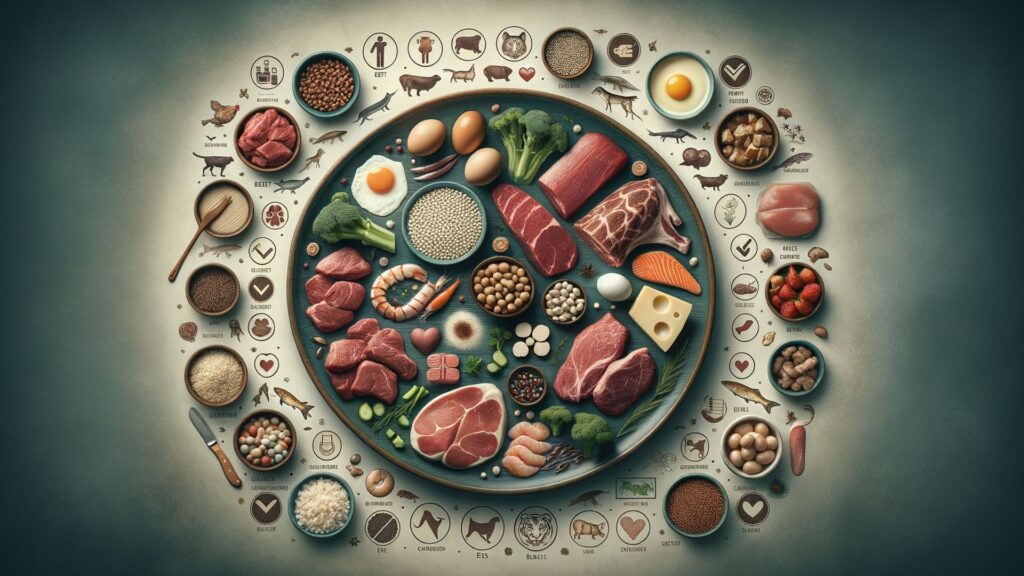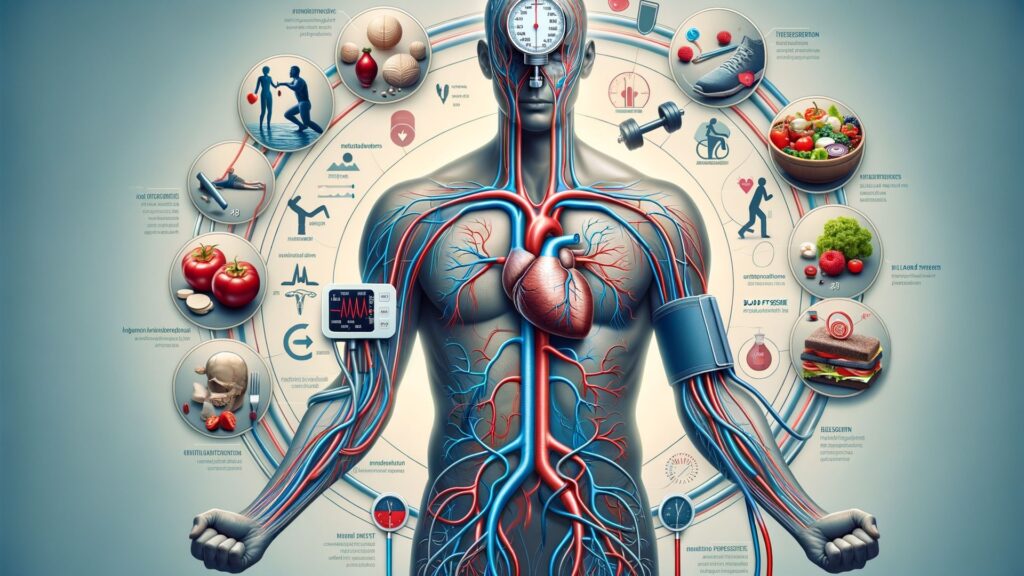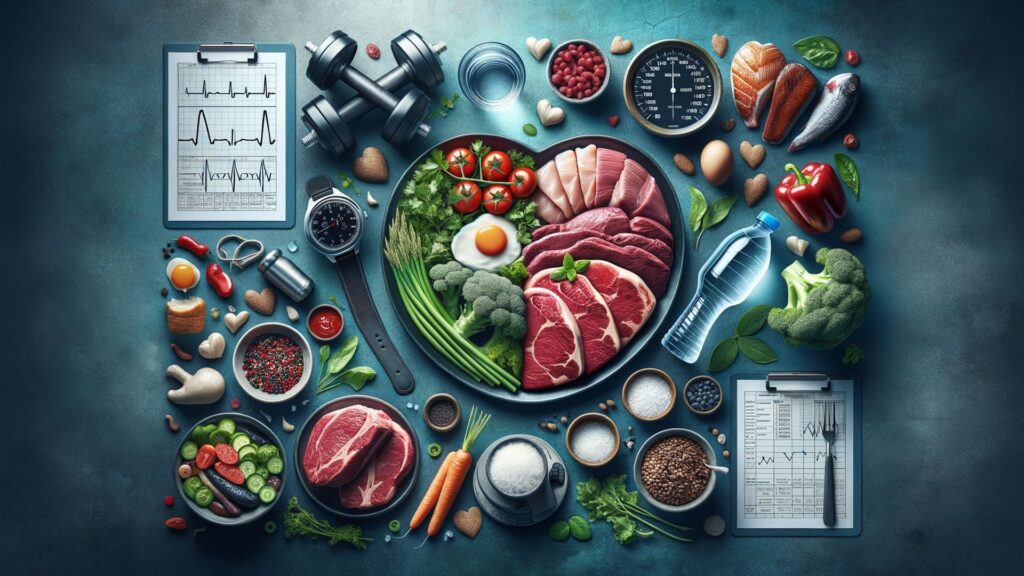Exploring the Impact of the Carnivore Diet on Blood Pressure and Hypertension
The carnivore diet, a dietary approach centered around animal products, has gained popularity in recent years for its perceived health benefits. By focusing on animal foods and eliminating plant-based foods, proponents of this diet believe it may have positive effects on various health markers. One such area of interest is its impact on blood pressure and hypertension.
The Basics of the Carnivore Diet
Overview of the Carnivore Diet
The carnivore diet is a restrictive eating plan that primarily consists of meat and animal products. Advocates of this diet suggest that by removing all plant-based foods, individuals can potentially improve their health and well-being. Those who follow the carnivore diet believe that humans are meant to be carnivores, as our ancestors primarily consumed meat and animal products for sustenance. They argue that by removing carbohydrates and plant-based foods from the diet, individuals can reduce inflammation, improve digestion, and experience weight loss.
However, critics of the carnivore diet argue that by eliminating whole food groups, individuals may be missing out on essential nutrients such as fiber, vitamins, and minerals that are found in plant-based foods. They also raise concerns about the long-term effects of consuming high amounts of saturated fat and protein from animal sources.
It is important to note that the carnivore diet is a highly restrictive eating plan and should be approached with caution. Before starting any new diet, it is recommended to consult with a healthcare professional or registered dietitian to ensure that it is safe and appropriate for your individual needs.

Benefits of Following a Carnivore Diet
Supporters claim that the carnivore diet may lead to weight loss, improved blood sugar levels, and reduced inflammation.
Additionally, some individuals report increased energy levels and mental clarity when following this diet. Critics, however, argue that the carnivore diet is unhealthy as it eliminates many essential nutrients found in fruits, vegetables, and grains. They also warn that a diet high in red meat and saturated fats may increase the risk of heart disease, cancer, and other chronic health conditions.
Additionally, the long-term sustainability and ethical implications of consuming only animal products are major concerns for many people. It is important to consult with a healthcare provider or registered dietitian before making any drastic changes to your diet to ensure that you are meeting your nutritional needs.
Understanding Blood Pressure and Hypertension
What Is Blood Pressure and How Is It Measured?
Blood pressure is the force exerted by the blood against the walls of the arteries as the heart pumps it around the body. It is measured in millimeters of mercury (mmHg) and consists of two values: systolic pressure (when the heart beats) and diastolic pressure (when the heart rests). A normal blood pressure reading is usually around 120/80 mmHg. However, blood pressure can vary throughout the day and can be influenced by factors such as stress, physical activity, diet, and medication.
High blood pressure, also known as hypertension, is when the pressure in the arteries is consistently elevated. This can increase the risk of serious health conditions such as heart disease, stroke, kidney disease, and vision problems.
Low blood pressure, also known as hypotension, is when the pressure in the arteries is lower than normal. While it may not always cause symptoms, it can lead to dizziness, fainting, and fatigue in some cases.
It is important to monitor your blood pressure regularly and make lifestyle changes to keep it within a healthy range. This may include maintaining a healthy weight, exercising regularly, eating a balanced diet, limiting alcohol intake, managing stress, and avoiding smoking.
If you have concerns about your blood pressure, it is important to consult with a healthcare provider who can provide guidance and recommendations on how to manage it effectively.

How Does the Carnivore Diet Affect Blood Pressure?
Research on the direct impact of the carnivore diet on blood pressure is limited. However, some proponents suggest that the elimination of processed foods and refined carbohydrates in this diet may contribute to lower blood pressure levels. A small study published in the Journal of Nutrition and Metabolism in 2010 found that participants following a Paleolithic diet (similar to a carnivore diet) experienced a significant decrease in blood pressure after 10 weeks. The researchers attributed this reduction to the elimination of processed foods and unhealthy fats typically consumed in a Western diet.
Another study published in the American Journal of Clinical Nutrition in 2017 found that a low-carbohydrate diet, which may include a significant amount of animal products, had a positive impact on blood pressure in overweight individuals. The researchers noted that the reduction in blood pressure was likely due to weight loss and improvements in insulin sensitivity.
It is important to note that more research is needed to fully understand the impact of the carnivore diet on blood pressure. Additionally, individual responses to the diet may vary, and it is essential to consult with a healthcare provider before making any drastic changes to your diet, especially if you have preexisting health conditions such as hypertension.
Connection Between High Blood Pressure and Heart Disease
High blood pressure, or hypertension, is a significant risk factor for heart disease. Persistent elevated blood pressure can lead to various cardiovascular complications, highlighting the importance of managing blood pressure levels effectively.
Some ways to manage high blood pressure include maintaining a healthy diet rich in fruits, vegetables, whole grains, and lean proteins, exercising regularly, reducing salt intake, limiting alcohol consumption, managing stress levels, and quitting smoking. Additionally, it is important to regularly monitor your blood pressure and follow any prescribed medication regimens as directed by your healthcare provider.
Untreated high blood pressure can lead to serious health issues such as heart attack, stroke, heart failure, and kidney disease. By taking steps to manage and control your blood pressure, you can reduce your risk of developing these complications and improve your overall heart health. It is important to work closely with your healthcare provider to develop a personalized plan to effectively manage your blood pressure and reduce your risk of heart disease.
Debunking Myths and Misconceptions
Impact of Saturated Fat and Red Meat on Blood Pressure
There has been ongoing debate regarding the role of saturated fat and red meat in blood pressure regulation. While some studies suggest a potential link between high intake of these foods and elevated blood pressure, the overall impact may vary among individuals. It is important to note that not all saturated fats are created equal, and some sources of saturated fats, such as coconut oil and dark chocolate, have been shown to have neutral or even beneficial effects on blood pressure. Additionally, the type of red meat consumed, as well as cooking methods, can also play a role in its impact on blood pressure.
Some studies have suggested that a diet high in saturated fat and red meat may lead to inflammation and oxidative stress, which can contribute to high blood pressure. On the other hand, other research has found no significant association between saturated fat intake and blood pressure levels.
It is also important to consider individual factors such as genetics, overall diet, lifestyle, and other health conditions when assessing the impact of saturated fat and red meat on blood pressure. It is recommended to focus on a balanced diet rich in fruits, vegetables, whole grains, lean protein, and healthy fats, and to limit the intake of processed and red meats high in saturated fats.
In conclusion, while there may be some association between saturated fat and red meat intake and blood pressure regulation, the overall impact is likely to vary among individuals. It is important to focus on a well-rounded diet and healthy lifestyle habits to support optimal blood pressure levels.
Role of Carbohydrates in Blood Pressure Regulation
Carbohydrates, particularly refined sugars and processed grains, can influence blood sugar levels and potentially impact blood pressure. The type and quality of carbohydrates consumed play a crucial role in overall cardiovascular health. Refined sugars and processed grains are quickly broken down by the body and can cause a rapid increase in blood sugar levels, leading to spikes in insulin production. These spikes in insulin can contribute to inflammation and damage to blood vessels, increasing the risk of high blood pressure and other cardiovascular issues.
On the other hand, complex carbohydrates, such as whole grains, fruits, and vegetables, are broken down more slowly by the body, providing a steady source of energy and helping to regulate blood sugar levels. Including these types of carbohydrates in your diet can help to lower the risk of high blood pressure and improve overall heart health.
It is important to be mindful of the types of carbohydrates you are consuming and prioritize whole, unprocessed options over refined and processed ones. By making healthier carbohydrate choices and maintaining a balanced diet, you can better regulate blood sugar levels and reduce the risk of high blood pressure and other cardiovascular issues.
Comparing Blood Pressure Effects of Plant-Based vs. Animal-Based Diets
Studies comparing the effects of plant-based and animal-based diets on blood pressure have shown mixed results. While plant-based diets rich in fruits, vegetables, and whole grains are often associated with lower blood pressure, individual responses to different dietary patterns can vary. Some studies have shown that vegetarian and vegan diets can lead to lower blood pressure levels compared to omnivorous diets, likely due to the higher intake of fiber, vitamins, and antioxidants. Plant-based diets are also typically lower in saturated fats and cholesterol, which can help reduce the risk of high blood pressure and cardiovascular disease.
On the other hand, some studies have found no significant differences in blood pressure levels between plant-based and animal-based diets. Factors such as overall diet quality, individual genetics, and lifestyle habits can all influence blood pressure levels, making it difficult to draw definitive conclusions.
It is important to note that a well-balanced diet that includes a variety of foods from both plant and animal sources can provide all the nutrients necessary for maintaining good health, including a healthy blood pressure. For individuals looking to lower their blood pressure, focusing on consuming whole, minimally processed foods, staying physically active, managing stress, and maintaining a healthy weight are key components of a heart-healthy lifestyle.
Consulting with a healthcare provider or registered dietitian can also help individuals develop a personalized diet plan to support their blood pressure goals.
Managing Hypertension While on the Carnivore Diet
Strategies to Control Blood Pressure Levels
Individuals following the carnivore diet should focus on monitoring their blood pressure regularly and implementing lifestyle modifications to control hypertension. Engaging in regular physical activity, maintaining a healthy weight, and managing stress can all contribute to better blood pressure management. It is also important to ensure adequate intake of nutrients such as potassium, magnesium, and fiber, which can help regulate blood pressure levels. Including a variety of nutrient-dense foods such as leafy greens, avocados, nuts, seeds, and fatty fish in the diet can help support overall cardiovascular health.
Additionally, limiting intake of processed meats and foods high in saturated and trans fats, which can contribute to high blood pressure, is important for those following a carnivore diet. Instead, focus on consuming lean cuts of meat, limiting salt intake, and incorporating plenty of fresh fruits and vegetables.
Finally, if blood pressure levels remain high despite these lifestyle changes, it is important to consult with a healthcare professional for further evaluation and potentially explore medication options to help manage hypertension effectively.

Healthy Food Choices within the Carnivore Diet
While the carnivore diet primarily emphasizes animal products, individuals can still make informed choices by selecting lean cuts of meat, incorporating seafood for omega-3 fatty acids, and ensuring adequate intake of essential nutrients like iron and vitamin D. Additionally, it is important to not rely solely on meat for all nutrients and to include a variety of non-starchy vegetables to help balance out the diet. It is also recommended to drink plenty of water and to listen to your body’s hunger and fullness cues while following the carnivore diet.
Some potential risks of the carnivore diet include nutrient deficiencies, particularly in fiber, vitamins, and minerals found in plant-based foods. It may also increase the risk of heart disease and other health conditions if not balanced properly. It is important to consult with a healthcare provider or registered dietitian before starting any new diet to ensure that it is safe and sustainable for you.
Overall, while the carnivore diet may have some benefits for certain individuals, it is important to approach it with caution and make informed choices to ensure overall health and well-being.
Potential Risks of High Blood Pressure and How to Mitigate Them
Uncontrolled high blood pressure can increase the risk of heart disease, stroke, and other serious health conditions. By adopting a comprehensive approach that includes regular medical check-ups, medication adherence (if prescribed), and lifestyle modifications, individuals can better manage their hypertension.
Some lifestyle modifications that can help lower blood pressure include:
1. Eating a healthy diet rich in fruits, vegetables, whole grains, and lean proteins.
2. Limiting salt intake and avoiding processed foods high in sodium.
3. Maintaining a healthy weight through regular exercise and physical activity.
4. Limiting alcohol consumption and avoiding smoking.
5. Managing stress through techniques such as meditation, yoga, or deep breathing exercises.
6. Getting enough sleep and practicing good sleep hygiene.
In addition to these lifestyle modifications, it is important for individuals with high blood pressure to regularly monitor their blood pressure levels at home and follow up with their healthcare provider as needed. It is also crucial to take any prescribed medications as directed by a healthcare provider to effectively manage hypertension and reduce the risk of complications.
By taking a proactive approach to managing high blood pressure through a combination of medical treatment, lifestyle modifications, and regular monitoring, individuals can significantly reduce their risk of developing heart disease, stroke, and other serious health conditions associated with uncontrolled hypertension.
Carnivore Diet To Lower Blood Pressure Frequently Asked Questions:
Q: What is the Carnivore Diet?
A: The Carnivore Diet is a dietary approach that involves consuming animal products exclusively and eliminating plant-based foods.
Q: How does the Carnivore Diet affect blood pressure?
A: Some studies suggest that the Carnivore Diet may lead to lower blood pressure levels in certain individuals, possibly due to the elimination of high-carbohydrate and processed foods.
Q: What are the potential benefits of the Carnivore Diet on blood pressure and hypertension?
A: The Carnivore Diet’s focus on animal products, which are typically low in carbohydrates, may contribute to improved blood pressure control and overall heart health in some people.
Q: Can the Carnivore Diet help with conditions like type 2 diabetes?
A: Some proponents claim that the Carnivore Diet’s restrictive nature and the absence of plant-based foods could potentially aid in improving blood sugar control and managing conditions like type 2 diabetes.
Q: Are there any risks associated with adopting a Carnivore Diet?
A: While some individuals on the Carnivore Diet may experience benefits, it is essential to consider the potential risks of following such a restrictive diet, including nutrient deficiencies and long-term health implications.
Q: How does the Carnivore Diet compare to the ketogenic diet?
A: The Carnivore Diet is often compared to the ketogenic diet due to its emphasis on animal products and low carbohydrate intake. However, the Carnivore Diet eliminates all plant-based foods, while the ketogenic diet allows for low-carb plant options.
Q: What are some common claims of the Carnivore Diet?
A: Supporters of the Carnivore Diet argue that it can help in weight management, improve energy levels, and enhance mental clarity, among other purported benefits.





